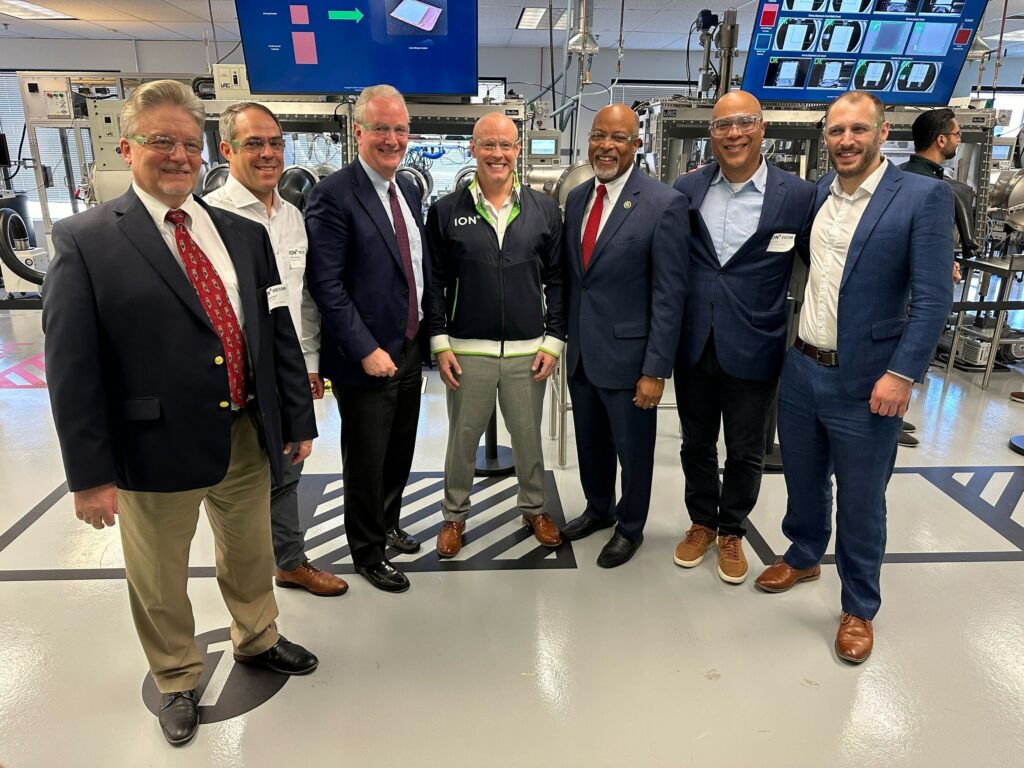
At a ceremony attended by U.S. Senator Chris Van Hollen, Congressman Glenn Ivey, and others, ION Storage Systems recently commissioned what is reported to be one of the largest solid-state battery manufacturing facilities in the U.S. (Photo courtesy ION Storage Systems/PRNewswire)
The state-of-the-art battery production line is expected to begin manufacturing 1MWh of battery cells this year, the company said.
BELTSVILLE, Md.— ION Storage Systems (ION), a manufacturer of what the company calls “safe, high energy density, fast-charging solid-state batteries,” reported that it recently commissioned one of the largest solid-state battery (SSB) manufacturing facilities in the United States.
The company said in a release that its state-of-the-art battery production pilot line, adjacent to ION’s headquarters in Beltsville, is expected to begin manufacturing 1MWh of battery cells this year. That production target is expected to grow to 10MWh by early 2025, with a longer-term goal of 500MWh of capacity by 2028.
ION’s facility is expected to bring skilled manufacturing jobs to Maryland over the next several years, according to the release.
“The world is increasingly reliant on batteries for our cars, personal and medical devices, for a more resilient power grid and for national defense,” said Ricky Hanna, CEO of ION Storage Systems, in the release. “Traditional Li-ION batteries simply haven’t been up to the task. From the outset, our goal has been to develop an advanced solid-state battery that delivers enhanced power, reliability, and safety, all while being scalable in production. This new facility, one of the largest of its kind, marks a significant step towards realizing that vision.”
ION said in the release that in contrast to traditional lithium-ion batteries, the company’s patented solid-state, no-anode technology forgoes graphite and other less-sustainable materials while maximizing battery performance capabilities through its 3-D ceramic structure. ION’s SSB architecture requires no compression, removing a long-time obstacle to the growth of SSBs. ION’s battery also requires no swell budget, extensive cooling systems, or heavy fire barriers, while accommodating existing and future cathode technologies. This translates to simple and cost-effective manufacturing at scale, the company said.
ION’s SSB is reported to be “the first and only compressionless solid-state battery technology to achieve ARPA-E and DOE VTO Fast-Charge goals at room temperature.” The company recently reported that its anodeless and compressionless SSB experienced negligible degradation after cycle testing.
ION is backed by a number of industry giants, including Toyota Ventures and Saint-Gobain. The company said it has been collaborating with the University of Maryland Center for Research in Extreme Batteries (CREB) to rigorously test its SSB battery before expanding into other markets, including electric vehicles, energy storage, consumer electronics, and aerospace.
ION’s commissioning of its SSB manufacturing facility was marked by a ceremony attended by special guests that included U.S. Senator Chriss Van Hollen, Congressman Glenn Ivey, and others.
“As we transition to cleaner energy sources and reduce pollution, we need improved battery and energy storage technology,” said Senator Van Hollen, in a statement. “With federal funding from the Department of Energy, partnerships with the University of Maryland, and tax incentives through the Inflation Reduction Act, we are spurring new technological advancements to support homegrown, start-up businesses to power our clean energy future. Today’s production launch shows how we can leverage the innovation and ingenuity at our institutions to generate American manufacturing jobs right here in Maryland.”
Congressman Glenn Ivey also commented, calling the commissioning of the state-of-the-art production facility “a great leap forward for ION Storage Systems in safe green battery technology.”
“I am proud that this company is born from the R&D of our flagship state school, the University of Maryland at College Park,” Congressman Ivey said in a statement. “Federal Grants from ARPA-E in the Department of Energy have furthered the development of this innovative technology, and collaboration with the University of Maryland and the Department of Defense ensures that we give our warfighters made-in-America technology that prevents adversaries from undercutting our national security capabilities. This technology also helps to stop the use of child and slave labor across the world in the mining of nickel and cobalt, which are the predominant components of old portable battery technology.”
